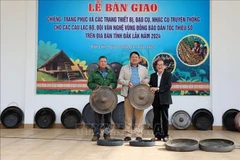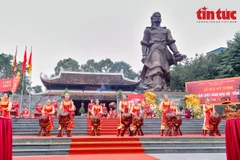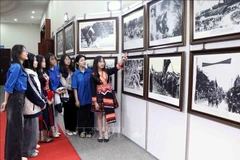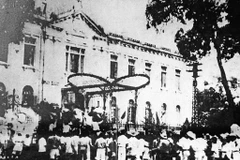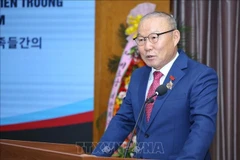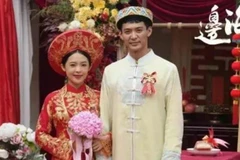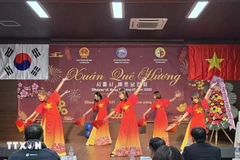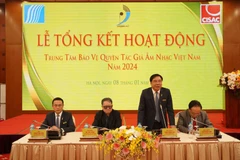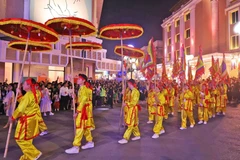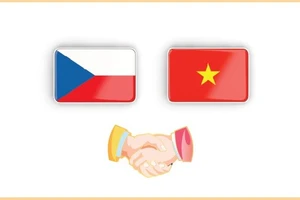Known in those days as Nguyen Tat Thanh, Uncle Ho made the decision togo abroad in 1911 and travel to discover the pathway to freedom, to beawake to Marxism-Leninism and become a communist devoted to the entireVietnamese people.
The first great turning point was Uncle Ho’s departure inthe summer of 1911, when he was 21 years old. On June 5, 1911, he leftthe nation on the ship, Admiral Latouche Treville using the name Van Baand began to earn his living by working at various jobs, together withself education and exploration of realities. He gradually took part inthe struggles of workers and people in places he visited.
June 5, 1911 was an especially significant milestone, not only in thelife of a person but also the history of a nation. At that time, NguyenTat Thanh himself neither understood that he was shouldering a greatnational historical task nor knew that on that day an extremely sacredmission had been assigned to him.
History affirmed thatafter many years, the young man had grown up from being Nguyen Tat Thanhto become known as Nguyen Ai Quoc, and from a person seeking pathwaysfor national salvation to a person guiding the entire nation.
France was the first country that Nguyen Tat Thanh wanted to visit onhis long journey. And this was also the dream of Nguyen Tat Thanh whenhe was young. “When I was 13 years old, it was the first time I heard,“Free France”, “equality”, and “humanity”. I really wanted to getacquainted with the French civilisation and to explore what was hiddenbehind these words.”
Nguyen Tat Thanh wanted to explorethe truths about France and its colonialism which was ruling Vietnam.This was a wise choice and a direction which was different from hispredecessor revolutionaries, reflecting the unique creativity in NguyenTat Thanh’s thoughts and activities.
“After seeing howthey do their business, I will return home to help my fellow citizens.”With an obvious driving force and goal and a defined direction, NguyenTat Thanh had chosen his own way and that meant leaving the nation andworking hard, “doing anything for the journey and living”.
After France, Nguyen Tat Thanh continued his journey, visiting othercontinents in the world with keen observation, exploration andexperiments. Wherever he set foot, he also witnessed the similarlymiserable lives of people living in colonial countries and the barbarouscrimes committed by colonialism.
Due to the explorationof French colonialism, he better understood colonialism in general andhe shared his sympathy with the working class and people who wereexploited and oppressed in those nations.
Following theearly years of his journey, Nguyen Tat Thanh discovered the pathway fornational salvation. This was the second great turning point in his lifewhich was attached to taking leave of the UK, for France.
By the end of 1917, Nguyen Tat Thanh returned to France from the UK tobecome directly involved in the overseas Vietnamese and French workers’movements. Nguyen Tat Thanh actually joined in the fight, with hisinvolvement in the movements of organisations and broad publicstruggles. He participated in diversified political, socio-cultural,scientific and artistic activities and various organisations,particularly the French Socialist Party.
In June, 1919,Nguyen Ai Quoc put forward an eight-point list of demands of theVietnamese people in front of the Versailles Conference. The demandsreflected the Vietnamese people’s desire and had a strong impact onVietnamese people in the country and abroad. A Vietnamese citizen calledNguyen Ai Quoc was courageous enough to put forward Vietnam’s politicalissues to the world, asking for practical and basic legitimate rightsfor Vietnam.
This was a new sign of the Vietnamese people’sstruggles on the way to national independence and from then on Nguyen AiQuoc really began his mission as the Vietnamese people’s pioneersoldier in the fight against French colonisalism, with one French secretagent recognising his qualities: “The slim young man full of vitalitymay be a person to put an end to our dominance in Indochina”.
Nguyen Ai Quoc read the first draft of theses on national and colonialissues written by V.I. Lenin in June, 1920 and published in thehumanitarian newspaper, an organ of the French Socialist Party, on July16-17, 1920. The headline of the article relating to the colonial issueimmediately attracted Nguyen Ai Quoc’s attention. In this document, V.I.Lenin clearly stated: “It is a must to distinguish between theinterests of the oppressed and exploited class and oppressed people whoare not entitled to enjoy the right of equality, and the nation thatapplies oppression and carries out exploitation to strike the trick inthe bourgeois democratic manner that is covering the overwhelmingmajority of people on earth who are enslaved by a small minority ofadvanced and very rich bourgeois nations, in terms of colonies andfinance”.
Lenin pointed out the liberation path tocolonial and dependant peoples and slowly developing nations.Proletarian and working people of all peoples and nations carried outcommon revolutionary struggles to overthrow landowners and the middleclass. Communist parties should provide direct support to colonialpeoples’ revolutionary movements.
During the time betweenseeking and finding the pathway to salvage the nation, Nguyen Ai Quocexperienced almost 10 years of work, study and struggle, withextraordinary perseverance and a creative scientific spirit. Nguyen AiQuoc came from patriotism to Leninism, the path to liberate the nationthat he found was precisely the revolutionary path under Lenin’srevolutionary theory.
Thanks to Lenin’s thesis, Nguyen AiQuoc found a basic orientation and pathway for national liberationrevolutionary movement, which included Vietnam’s own revolution. Thatbelief was an ideological foundation for Nguyen Ai Quoc to steadilyfollow a strict revolutionary road of Leninism and have thedetermination to follow Lenin’s great road.
From then on,the crisis of the revolutionary road in Vietnam’s revolutionary historywas over. The Leninism that Nguyen Ai Quoc received was considered aguiding star to lead the way to the success of Vietnam’s revolution.
The third great turning point of the journey was the time when NguyenAi Quoc became involved in founding the French Communist Party.
When the French Socialist Party convened the 18 th Congress in Tourcity at the end of 1920, Nguyen Ai Quoc attended the congress as thesole official delegate of Indochina’s colonial nations and joined themajority of delegates at the conference to vote for admission toInternational III (Communist International) and also became involved infounding the French Communist Party. The event marked the completion ofthis phase of his journey to salvage the nation – the road toproletarian revolution.
Nguyen Ai Quoc became the firstVietnamese communist, marking a decisive evolution in his ideologicalawareness and political stance, from an advanced patriotic person to asocialist soldier. Forty years later he reviewed the event and wrote:“From the very beginning, studying the glorious revolutionarytraditions and being trained in the real heroic struggle of workers andthe French Communist Party, I myself have found the truth ofMarxism-Leninism and turned from a progressive patriot to a socialistsoldier”.
The results of many years of practicalactivities in the working class and theoretical research of Marxism hadexpanded his awareness of revolution and the revolutionary road. Hehimself confirmed: “To salvage the nation and liberate the people, thereis no other way except the proletarian revolutionary path”. Hence,Nguyen Ai Quoc was the person who promptly attached Vietnam’srevolutionary movement to international workers’ movements and theworld’s revolutions, as well as attaching the struggle to liberate theVietnamese people to all other movements to liberate oppressed peoples.This awareness resulted from Nguyen Ai Quoc’s early approach to thestance of the proletarian class and Marxism-Leninism, and Nguyen Ai Quochimself was the first Vietnamese to find the way to salvage the nationwith the proletarian way.
We have clearly found the threegreat turning points attached to typical events in Nguyen Ai Quoc-HoChi Minh’s journey to salvage the nation. Experiencing each turningpoint of the journey led to an unceasing development in Nguyen Ai Quoc’sawareness of the revolutionary path and a significant premise to open anew prospective road for Vietnam’s revolution, that was later guided byPresident Ho Chi Minh and the Communist Party of Vietnam – nationalindependence attached to socialism and building a country of democracy,equality and civilisation as at present./.



